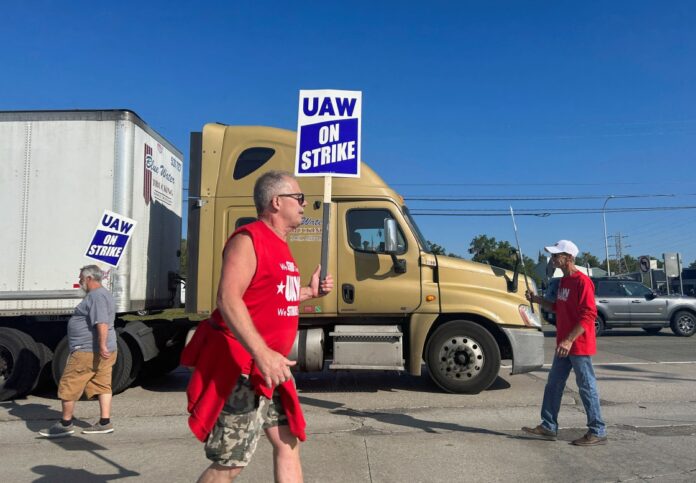
Ford Motor is facing the possibility of a strike in Canada if an agreement is not reached by 11:59 p.m. on Monday with the union representing approximately 5,600 Canadian auto workers. This comes just days after workers at one of its U.S. plants went on strike.
The United Auto Workers (UAW) union initiated a targeted strike against Ford, General Motors, and Stellantis (Chrysler’s parent company) on Friday, focusing on one assembly plant at each of these automakers.
Unifor, the Canadian union with a contract set to expire at 11:59 p.m. on Monday has stated that “while we remain at the table, the likelihood of a strike increases with each passing hour.”
Ford operates two engine plants in Canada that manufacture V-8 motors for F-series and Super Duty pickups assembled in the United States. It also has an assembly plant in Ontario. A strike by Canadian workers that halts production at these engine plants could severely disrupt U.S. production of Ford’s most profitable vehicles, even if the UAW decides not to call for walkouts at truck plants in Kentucky, Dearborn, Michigan, and Kansas City, Missouri.
Talks between the UAW and the Detroit automakers continued on Monday as the auto workers’ strike over pay extended into its fourth day with little indication of progress toward a resolution. Approximately 12,700 workers are on strike at the three U.S. plants.
Union negotiators and representatives from GM, Ford, and Stellantis engaged in discussions over the weekend in an effort to end one of the most ambitious industrial labor actions in the U.S. in decades. On Monday, the UAW had scheduled a new round of talks with Ford for late afternoon.
Stellantis is currently exploring options for its expansive headquarters complex in Auburn Hills, Michigan, north of Detroit. The company has stated that it no longer requires all the space in the complex since many employees are working remotely all or part of the time.
UAW President Shawn Fain noted on Monday that there had been “minimal conversations over the weekend, so the ball is in their court…. We have a long way to go.” When asked whether the strike would be expanded to other plants this week, he stated that the UAW is prepared to do what is necessary.
In a separate interview on MSNBC, Fain mentioned that talks were progressing slowly and that they would assess the situation in the coming days and take further action if necessary.
Treasury Secretary Janet Yellen stated that it is too early to predict the strike’s impact on the economy, as it would depend on the duration of the strike and what areas are affected.
The strikes have already led to halted production at plants in Michigan, Ohio, and Missouri, affecting the production of popular models like the Ford Bronco, Jeep Wrangler, and Chevrolet Colorado, among others.
Ford took action on Friday by furloughing 600 workers who are not part of the strike at the Michigan Bronco plant due to the strike’s impact. GM expects to suspend operations at its Kansas car plant early in the week due to the strike at its nearby Missouri plant, affecting 2,000 workers.
Analysts predict that plants producing more profitable pickup trucks, such as Ford’s F-150, GM’s Chevy Silverado, and Stellantis’s Ram, may become the next targets of strikes if the current walkout continues. The strike has also had a ripple effect on other businesses, with shares of BlueScope Steel reaching an over three-month low due to the strike’s impact on its North American operations. The Australian steelmaker derives nearly 42% of its fiscal 2023 sales revenue from North America.
The ongoing disputes between the unions and the companies primarily revolve around pay and benefits for workers. The three automakers have proposed 20% raises over the 4.5-year term of their proposed contracts, although this is only half of what the UAW is demanding through 2027. At one point during the negotiations, the UAW offered to lower its demand to 36%.
In addition to higher wages, the UAW is also pushing for shorter workweeks, the reinstatement of defined benefit pensions, and stronger job security as automakers transition to electric vehicles. The outcome of these negotiations could have far-reaching implications for the auto industry’s future.









